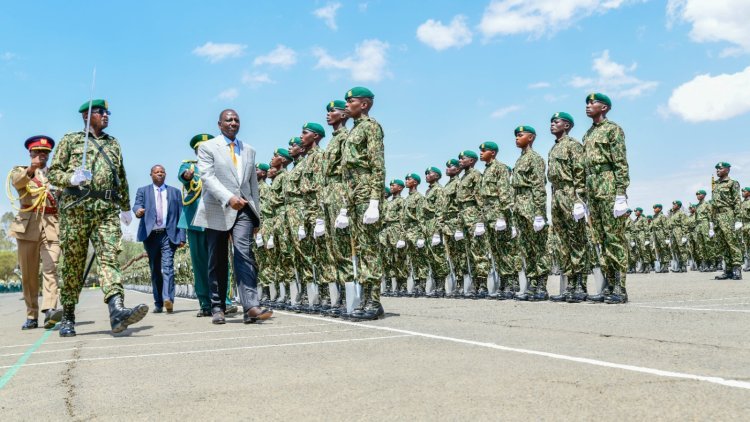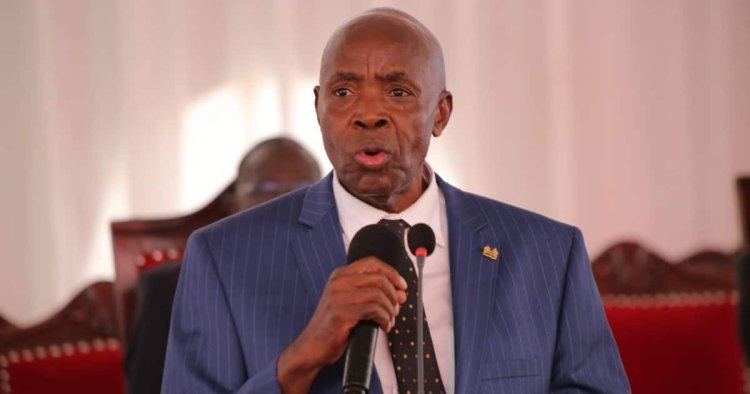Graduates Will Need NYS-Like Training Before Entering University & Getting Jobs
The task force appointed by President Ruto to come up with a plan for improving Kenya's education system also took into consideration the Competency Based Curriculum (CBC)

The government is on the verge of reviving mandatory community service training which is similar to the National Youth Service (NYS) program in the 1980s in the event President William Ruto adopts recommendations by the Presidential Working Party of Education Reforms (PWPER).
The team led by Prof Raphael Munavu in their report on Tuesday, August 1 recommended that all students graduating from senior school (secondary school) be subjected to mandatory community service training for a period of three months.
At the same time, those graduating from university will be required to go through the same training for nine months before entering the job market.
"It is, therefore, needful to re-introduce the Community Service Learning programmes for students upon graduation, to promote peaceful co-existence and cultivate a sense of patriotism, appreciation of diverse cultures and work ethics in our youth," the report noted.

President Ruto receiving a report from the Presidential Working Party on Education Reforms on August 1, 2023. /PCS
In a bid to convince university graduates to undergo the training, community service was proposed as a requirement before entering the job market.
"A certificate of compliance to the community service to be issued as proof before admission into the world of work," the committee recommended.
The task force appointed by President Ruto to come up with a plan for improving Kenya's education system also took into consideration the Competency Based Curriculum (CBC) which ran into challenges since its implementation by former President Uhuru Kenyatta.
It emphasized community service as a mode of training so as to equip learners with the know-how to handle responsibilities they will encounter in university and the job market.
The responsibility for implementing the mandatory community service has been placed on the Ministry of Education, despite the report not revealing when the community learning would kick off once implemented.
"Community Service Learning encourages learners to develop an understanding of civic responsibility to support and strengthen their communities," the report noted.
"MoE to develop and operationalise a policy for mandatory Community Service Learning Programmes for all students upon completion of Senior School, TVET and University education."
The programme will be implemented in two components with the first three months being after Senior School in one’s home County, while the rest be in another County after TVET/University education in order to enhance cross-cultural interaction and national cohesion.
On CBC, PWPER recommended that it be implemented but with modifications so as to achieve the desired objectives.
“Findings show that CBC is good for the country; it has great potential to lay a strong foundation for relevant human capital development, which is required for societal transformation and sustainable development,” the report read in part.
“There is significant support for CBC in the country, but there is a need to reform aspects of curriculum delivery and implementation in order to achieve the desired objectives."
Also proposed was for the Kenya Institute of Curriculum Development (KICD) to alter the learning areas so that they don't exceed five in pre-primary, not more than seven in lower primary and not to exceed eight in upper primary. In Junior Secondary and Senior School, PWPER recommended nine and seven units to be taught respectively.
The task force also recommended for the Ministry of Education to do away with the categorization of public secondary schools from the current nomenclature (national, extra-county, county, and sub-county) to career pathways (STEM, social science, and arts and sports science).
The task force also recommended that the computation of the Kenya Certificate of Secondary Education (KCSE) mean score by the Kenya National Examinations Council (KNEC) be based on Mathematics, English or Kiswahili, and five other best-performed subjects.
PWPER further suggested the Ministry of Education with support from the Ministry of ICT to leverage technology at all levels of education by developing ICT infrastructure for curriculum delivery; improving digital literacy among teachers, parents, and other key stakeholders.
Furthermore, it was recommended that all teachers undergo fresh training to align themselves with curriculum changes, which is expected to last a year.
"The Ministry of Education to develop guidelines on how all teachers who graduated before 2023 undergo a mandatory one-year retooling and upgrading programme for compliance with the curriculum change," read the recommendation in part.
To increase the number of quality teachers entering the profession, the task force recommended a C (plain) as the grade for admission to pre-service teacher education. For example, a person should have attained C (plain) in KCSE or its equivalent in Senior School for a Diploma in Early Childhood Teacher Education.
Other pre-service courses that require a C (plain) include Diploma in Secondary Teacher Education, Diploma in Special Needs Education and Diploma in Technical Teacher Education.
Other Key Recommendations

Education CS, Ezekiel Machogu during a past address. /FILE

 admin
admin 




